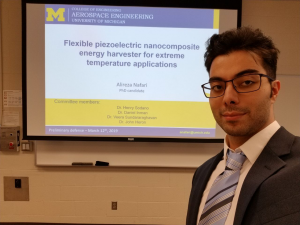Presented By: Aerospace Engineering
Defense Dissertation: Flexible Piezoelectric Nanocomposite Energy Harvester for Extreme Temperature Applications
Alireza Nafari

Alireza Nafari
Doctoral Committee:
Professor Henry A. Sodano, Chair
Professor Daniel J. Inman
Associate Professor Veera Sundararaghavan
Assistant Professor John Huron
Event Information:
Friday, May 17th 3:00 PM
General Motors Conference Hall, Lurie Engineering Center
Piezoelectric materials are currently among the most promising building blocks for sensing, actuation and energy harvesting systems. However, these materials are limited in many applications due to their lack of machinability as well as their inability to conform to curved surfaces. One method to mitigate this issue is through additive manufacturing (direct printing) of piezoelectric nanocomposites, where piezoelectric nanomaterials are embedded in a polymer matrix. With the advent of additive manufacturing it is now possible to realize 3D print nanocomposites with tailored microstructure.
A primary objective of this study is to develop and experimentally validate micromechanical and finite element models that allow the study of the electroelastic properties of a 3D printed nanocomposite containing piezoelectric inclusions. Furthermore, the dependence of these properties on geometrical features such as aspect ratio and active phase alignment are investigated. This dissertation presents a novel approach for harvesting ambient mechanical energy at extreme environments. Many miniature electronic sensors and actuators in aerospace applications risk breakdown due to their operation in extreme temperature conditions, as cooling and protecting them prove to be challenging due to space and weight limitations. Therefore, as a second objective of this investigation, a flexible energy harvester capable of withstanding extreme temperatures (< 250 °C) is developed using a 3D printing approach that can provide useful electrical energy from ambient vibrations. The research presented in this dissertation can provide a robust tool for the analysis and design of two phase piezoelectric nanocomposite energy harvesters able to operate under a spectrum of conditions ranging from ambient to extreme temperatures.
Doctoral Committee:
Professor Henry A. Sodano, Chair
Professor Daniel J. Inman
Associate Professor Veera Sundararaghavan
Assistant Professor John Huron
Event Information:
Friday, May 17th 3:00 PM
General Motors Conference Hall, Lurie Engineering Center
Piezoelectric materials are currently among the most promising building blocks for sensing, actuation and energy harvesting systems. However, these materials are limited in many applications due to their lack of machinability as well as their inability to conform to curved surfaces. One method to mitigate this issue is through additive manufacturing (direct printing) of piezoelectric nanocomposites, where piezoelectric nanomaterials are embedded in a polymer matrix. With the advent of additive manufacturing it is now possible to realize 3D print nanocomposites with tailored microstructure.
A primary objective of this study is to develop and experimentally validate micromechanical and finite element models that allow the study of the electroelastic properties of a 3D printed nanocomposite containing piezoelectric inclusions. Furthermore, the dependence of these properties on geometrical features such as aspect ratio and active phase alignment are investigated. This dissertation presents a novel approach for harvesting ambient mechanical energy at extreme environments. Many miniature electronic sensors and actuators in aerospace applications risk breakdown due to their operation in extreme temperature conditions, as cooling and protecting them prove to be challenging due to space and weight limitations. Therefore, as a second objective of this investigation, a flexible energy harvester capable of withstanding extreme temperatures (< 250 °C) is developed using a 3D printing approach that can provide useful electrical energy from ambient vibrations. The research presented in this dissertation can provide a robust tool for the analysis and design of two phase piezoelectric nanocomposite energy harvesters able to operate under a spectrum of conditions ranging from ambient to extreme temperatures.